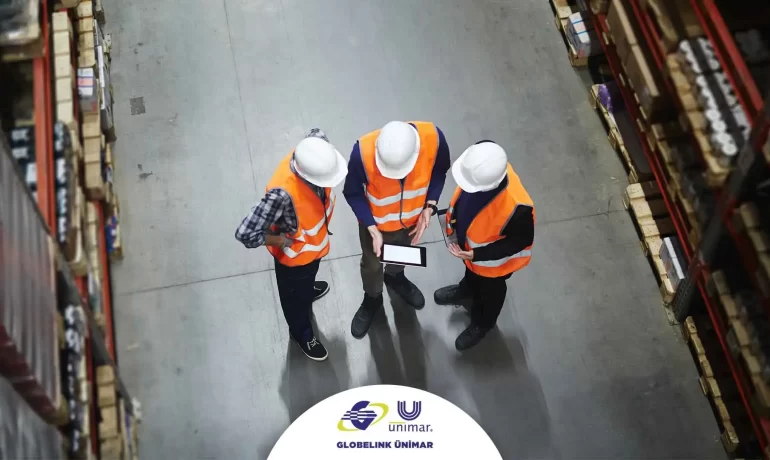
Ms. Damla Alışan, Alışan Logistics Board Vice President and one of the successful female executives of the logistics world, states that digitization has started to become more entrenched in the industry after the pandemic, and as Alışan Logistics, they want to create a working model in which the real and virtual structures can act together. Noting that technology and digitization will deepen in every field of the industry, Ms. Alışan points out that there will be changes in leadership positions at this point and women will be more glorious at this stage: “Women will mark the digital age. I think that the number of female leaders and female employment will increase in our digitized industry.”
How did Alışan Logistics manage the pandemic period? Have you experienced a loss or a profit in this period when logistics has become more important despite everything?
As Alışan Logistics, we have understood the importance of technology and logistics 4.0 studies in this period once again. First of all, within the scope of the pandemic measures we have taken in-house, we popularized the remote / home working model as of March; we changed the way we do business. We maintained an uninterrupted but protected service and increased our cooperation with the public in this context. We ensured employee satisfaction within the company. On the other hand, thanks to our automation and smart technologies, we aimed to keep our distribution centers and warehouses operating in times of crisis. All of these have resulted in us gaining efficiency despite the crisis and thus, increasing our customer satisfaction and service quality.
The logistics industry has become one of the branches that suffered the biggest loss of business volume due to reasons such as international shipping, long waiting periods at the borders, driver quarantine processes and the import/export shrinkage caused by the Coronavirus. However, the logistics industry is reflexive to crises due to its nature. For this reason, I believe that our industry has emerged stronger from the pandemic despite everything and will continue to do so.
When we look at Alışan Logistics, we closed the year with a growth of over 20 percent again and took our place among the companies of Fortune 500 for the fifth time. When we look at the intermodal transport modes, we see a contraction in this period in line with the explanations above. However, I believe that the logistics industry will reach the business volumes increasing in parallel with the increase of the global integration of Turkey’s foreign trade with the improvement of the pandemic conditions.
How did the situations such as the closures of roads, supply chain breakage, and the decrease in demands reflected on your supply structure and operation? What kind of a savior role did your strong agency network and relationships in Europe play in this process?
Since we mainly transport chemicals and FMCG, there has not been a significant decrease in capacity in our services to the food and cleaning materials industries. As an important link in the supply chain in order to rotate the wheels and help consumers reach their basic needs, we are on duty since the beginning of the pandemic together as Alışan Logistics and with the wide agency network that we own since 1985.
Pandemic is expected to trigger the production of the products in the country where they will be sold. In other words, local production will increase and logistics will accelerate in this direction.
Have the severity of the process and the uncertainty about it changed your position abroad? What kind of new mechanisms have you put into use both in Turkey and abroad?
As Alışan Logistics, we have set ourselves a growth target of twenty percent for 2021 as in previous years. We mostly operate in road transport in our country. We all have using rail, sea transport and therefore intermodal transport modes more on our agenda for years. We have goals such as developing in these areas, maintaining our geographic growth throughout the country, rejuvenating our fleet, creating innovations in VAS operations, and strengthening our technological infrastructure.
Due to the COVID-19, international shipping and travel restrictions prevented products, like people, from reaching one point to another. This situation is expected to trigger the production of the products in the country where they will be sold. In other words, local production will increase and logistics will accelerate in this direction. We have prepared a road map to update our business plans according to this differentiation.
Digitization has become one of the most discussed issues due to the pandemic. You also have an increasing number of R&D studies since 2017. Have you started the digital transformation move? How has the pandemic affected your studies on digitization? What mission will the digitization of the industry undertake in the new system and the new normal?
Our aim is to be a part of the changing world and to provide services blended with technology. In this context, as a company, we focus on a working system where the real and virtual worlds act together, users and transportation vehicles communicate with each other so that the processes run without errors and in a more efficient way.
The pandemic has brought compulsory changes to the industry, especially in e-commerce. More common warehousing and micro-distribution activities have come to our agenda and will continue to remain on the agenda next year. Because stock policies have changed and are changing. The “just in time” product policy has become a production policy that will be redesigned after the quarantine period. From now on, institutions will readjust their inventories against uncertainties and tend to keep more stocks.
We focus on a working system where the real and virtual world move together, users and transportation vehicles communicate with each other, processes are processed without errors and more efficiently.
As a female boss, how did you contribute to female employees in your company and the industry?
As Alışan Logistics, we have established an egalitarian policy within the company for a long time with our Gender Policy, Equal Opportunity Policy and even Zero Tolerance to Violence Policy. If we look at the rate of female employees in our company, which has the global “Women-Owned Business” certificate, we have reached 23 percent in female employment in 2020, which we increased by 21 percent in 2019. Women make up 75 percent of our board of directors.
The first female stacking machine operator in the logistics industry was trained within our organization. Yes, it is difficult to be a woman in the industry, but as you can see, there is nothing we cannot achieve.
As a company, we give endless support to women’s education. In this direction, we founded Ayşe Sıdıka Alışan Primary School in Gebze Region where our company is established, and in addition, we are producing support projects for girls in the East with the “Alışan Is Carrying Happiness” project that we have developed. In addition to these, we have started to support women in sports by sponsoring Vakıfbank women’s volleyball team, the team that won the most cups in the international arena in our country.
Besides, as Alışan, we attach great importance to female employment. In this context, we have become the only logistics company to sign the Women’s Empowerment Principles, which is one of the global and most important initiatives of the private sector, conducted by the United Nations globally, and aims to employ and empower women in all sectors and at all levels, and we have taken it as a guide.
What are the factors that shape female employment and female labor in the logistics industry? Where do the “family responsibilities and obligations”, which are mentioned so much for women, stand in this?
The male-dominated image in the logistics industry has started to change with the proliferation of female executives in recent years. We observe that women achieve significant success in the field of logistics, as in every sector. The fact that women are more detailed, meticulous and patiently brings a different approach to the business.
Logistics is one of the most dynamic industries in the business world. Although it has certain rules, it is a living industry. This requires serious follow-up, coordination and organization. At this point, female executives come to the fore. I believe that the way to success in this industry, which mostly consists of male employees, is harmony and good communication with colleagues. Women provide an advantage in the business world with their strong hunches, sense of responsibility, communication skills and patience.
We shall not forget that being successful in business is not about gender but about knowing what you want and matching them with your abilities. If you know your job and make it feel, your gender is not a subject of matter, on the contrary, you are respected regardless of your gender.
In the last 20 years, expertise areas in logistics have emerged. Managements also need to keep up with the change in order to follow the innovations and make quick decisions.
The number of female executives in the industry has been increasing in recent years, but the number of entrepreneurs has not entered its infancy yet. Why do you think? Where does the “family business” structure stand here?
The fact that the entrepreneurial phenomenon has gained momentum in Turkey, especially with the digital/technological processes reveals significant opportunities for the logistics industry. Start-ups, which enter the industry by seeing the needs, offer services that have not been provided in transportation until now and digital transactions provide a significant cost advantage to customers. The industry has changed very rapidly. In the last 20 years, some giants in this area have united, some who cannot keep up with changes have been eliminated. Specialization areas in logistics have emerged. Managements also need to keep up with the change in order to follow the innovations and make quick decisions.
Although family companies are naturally one step behind at the first step in this regard, I can say that this gap is being closed with the increasing dominance of the second generation.
“Female Leaders are More Prepared for the Technological Revolution”
KPGM Global Female Leaders Survey, which was realized for the first time in the world with the participation of Turkey, has revealed that female leaders are better prepared for the technological revolution. The responses of the female leaders participating in the study show that they are more familiar with new technologies, adapt to new developments quickly, think analytically and make decisions based on data compared to male leaders. According to the research, women will mark the digital age. I think that the number of female leaders and female employment will increase in our digitalized industry.
Artificial Intelligence is Both Changing and Transforming
Today, we can see the clues that we will
The Future of the Cargo Market is Shaped by e-commerce
The e-commerce industry has been growing rapidly since the



